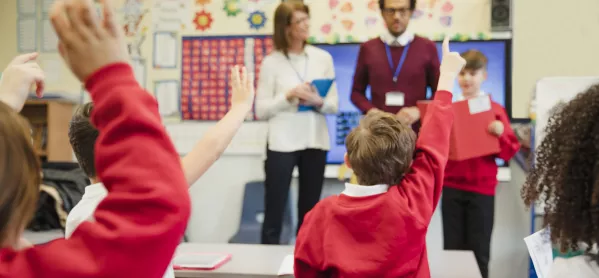The government is being urged to consult with Ofsted and the children’s commissioner on “how to hold schools to account” on their catch-up effort.
And ministers should set out how they plan to help “close the attainment gap, reduce exclusions and ensure that disadvantaged children’s education will not suffer adverse long-term effects from the first lockdown”, according to a new parliamentary report.
The House of Lords Public Services Committee heard that just one in 10 children defined as vulnerable attended school or early years education during the coronavirus lockdown.
Revealed: Hidden Covid impact on schools in poorest areas
Exclusive: Poorer schools hit twice as hard by lockdown
Research: More Covid cash needed for poorer ‘double-blow’ schools
And hundreds of thousands of “invisible” children are falling through gaps between social and education services across England, the report notes.
In its conclusions and recommendations for the government, the committee says schools should be held to account for their catch-up provision.
Coronavirus: The impact of lockdown on vulnerable pupils
“There is a serious risk that disadvantaged children will fall further behind as a result of school closures during the pandemic,” the report says.
“The government should set out how it will support early intervention in education services to close the attainment gap, reduce exclusions and ensure that disadvantaged children’s education will not suffer adverse long-term effects from the first lockdown.
“The government should consult with Ofsted and the children’s commissioner on how to hold schools to account and measure progress made in supporting disadvantaged children to catch up.”
Peers also found that disadvantaged and vulnerable children “face more risk of abuse and dropping further behind due to Covid-19 school closures”.
Fewer home visits by social workers due to Covid made the situation worse, the study notes.
Baroness Armstrong of Hill Top, chairwoman of the Public Services Committee, said: “Government, local authorities and other public service providers are not working together effectively to protect vulnerable children.
“Before Covid-19 many vulnerable children couldn’t get the public services they needed. With most unable to attend school because of the lockdown, they had little support and many more have become invisible after losing contact with public services during the pandemic.”
The study calls for the Troubled Families Programme and community services, like children’s centres and family hubs, to be extended and expanded.
And the committee says schools should work more with mental health professionals, police liaison officers and youth workers to meet vulnerable children’s needs.
Peers also want the government to recognise “the vital role of preventative public services in reducing deep and ongoing inequalities exacerbated by Covid-19”.
And “introduce a race equality strategy that would apply across public services to address health, care and educational inequalities”.
A government spokesperson said: “We have always put vulnerable children at the heart of our response to the pandemic and kept schools, nurseries and colleges open to them during the lockdown period.
“We have focused on getting every pupil back into the classroom full time this term because it is often the best place for them. As of last week [5 November], approximately 83 per cent pupils with a social worker were attending school.
“We know many vulnerable children have felt additional pressures at this time which is why their safety and wellbeing remains our priority.
“We have made an extra £4.6 billion available to councils to respond to these changing pressures, invested millions of pounds in charities working with vulnerable children and brought back thousands of social workers onto a temporary register to help where needed.”




